Topsy-Turvy by Jules Verne (best book recommendations .txt) 📕

- Author: Jules Verne
Book online «Topsy-Turvy by Jules Verne (best book recommendations .txt) 📕». Author Jules Verne
“Bravo, Mrs. Scorbitt! I see in you once more the generous patron of our Society. No, I have never doubted your great heart.”
“Thank you, Mr. Maston.”
“In regard to myself,” continued Maston, “allow me to say, before telling the point of the earth where our great shooting will take place—sell, so to speak, the secret which I have been able to keep so well, to allow these barbarians to fly and pursue our friends, to interrupt their works, which will make our profit and glory, I would rather die.”
“Splendid, Mr. Maston!” cried Mrs. Evangelina Scorbitt.
And these two beings, united by the same enthusiasm, crazed by it if you will, one as well as the other, were well matched in understanding each other perfectly.
“No, they will never know the name of the country which my calculations have designated, and the reputation of which will become immortal,” said J. T. Maston. “They can silence me if they like, but they will never have the secret from me.”
“And they can kill me with you,” said Mrs. Evangelina Scorbitt; “I will also be mute.”
“It is lucky, dear Evangelina, that they are ignorant of your knowledge of the place.”
“Do you believe that I would be capable of betraying it, because I am only a woman? Betray my associates and you! No, my friend, no. If they should raise the whole city and country against you—if the whole world would come to the door of this cell to take you away, I shall be there, too, and we will at least have one consolation—we will die together.”
As if there could be any greater consolation and Mr. Maston could dream of a sweeter death than dying in the arms of Mrs. Evangelina Scorbitt! And so ended the conversation every time that this excellent woman visited the prisoner. And when the Inquiry Committee asked her what the result was, she would say: “Nothing as yet; perhaps with time I shall be able to reach my point.”
Ah, women, women! What are women? “In time,” she urged. But time went on with fast steps. Weeks went ’round like days, days like hours and hours like minutes.
It was already May. Mrs. Evangelina Scorbitt had not been able to get any information from J. T. Maston, and where she had failed there was no hope of any other person succeeding.
Was it, then, necessary to accept this terrible shock without interfering in any way? No, no! Under such circumstances resignation was impossible. The European delegates became more and more out of spirits. There was wrangling between them every day. Even Jacques Jansen woke up out of his Dutch placidity and annoyed his colleagues greatly by his daily charges and countercharges. Col. Boris Karkof even had a duel with the Secretary of the Inquiry Committee in which he only slightly injured his adversary. And Major Donellan; well, he neither fought with firearms nor with bare fists, quite contrary to English use, and he only looked on while his Secretary, Dean Toodrink, exchanged a few blows according to prize-ring rules with William S. Forster, the phlegmatic dealer in codfish, the straw man of the N.P.P.A., who really knew absolutely nothing of the affair.
The whole world was leagued against the United States and wanted to hold the Americans responsible for the actions of one of their number—the celebrated Impey Barbicane. There was talk of recalling the ambassadors and the foreign Ministers at present accredited to this most reckless Government at Washington and of declaring war against the United States. Poor United States! It only wished to lay its hands on Barbicane & Co. In vain did the Republic reply to the Powers of Europe, Asia, Africa and Australia that they were at liberty to arrest these adventurous Americans wherever they found them. Nobody would listen patiently to such talk. And so, far away President Barbicane and his associate were occupied in preparing their great operation. As nothing could be found of them the foreign countries began to say: “You have their accomplice; now it is sure that Mr. Maston knows where these people are and what they are doing. Make him speak, this man, Mr. Maston. Why not use hot oil, melted lead, etc.? Why not use such means as were used formerly under circumstances less grave and for cases which only interested a few private people?” But it was answered that, while such means were justified in former times, they could not be used at the end of a century as far advanced as the nineteenth century was. Therefore, J. T. Maston had nothing to fear in that line; all that was left to hope was that he would finally consider the enormity of his crime and would decide to reveal his secret, or that some accident would reveal it for him.
At the Close of Which J. T. Maston Utters an EpigramTime went on, however, and very likely also the works of Barbicane and Capt. Nicholl who were going on also under these very surprising conditions, no one knew where.
How was it possible, it was asked, that an operation which required the establishment of a considerable iron foundry, the erection of high blast furnaces, capable of melting a mass of metal a million times as large as the marine corps cannon of 27 centimeters, and a projectile weighing 180,000 tons, all of which necessitated the employment of several thousand workmen, their transport, their management, etc.—yes, how was it possible that such an operation could go on without the interested world getting any knowledge of it. In which part of the Old or New World had Barbicane & Co. secretly established a foothold so that no hint was given to people living in the vicinity? Was it on a deserted island in the Pacific Ocean or in the Indian Ocean? But there were no more deserted islands: the English had gobbled them all





Comments (0)